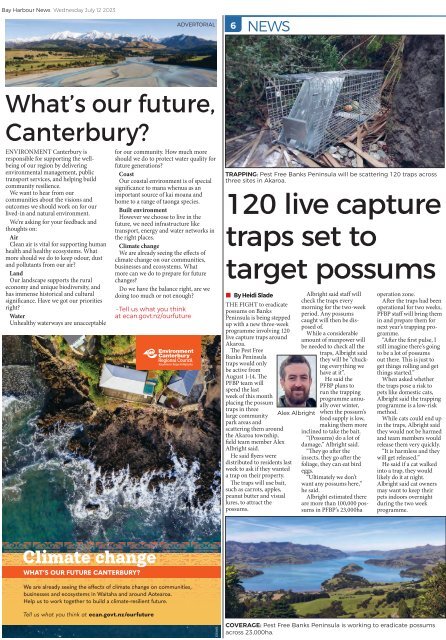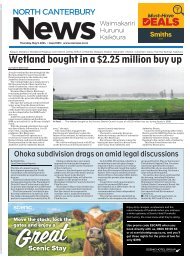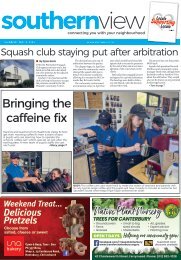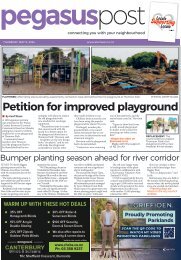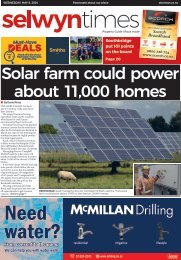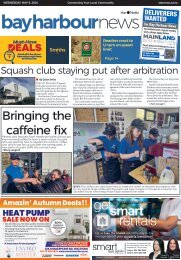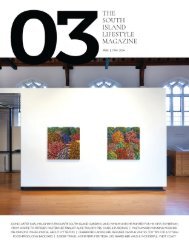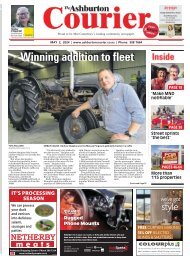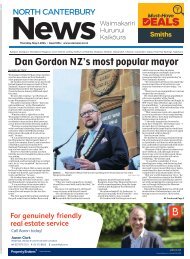Bay Harbour: July 12, 2023
Create successful ePaper yourself
Turn your PDF publications into a flip-book with our unique Google optimized e-Paper software.
<strong>Bay</strong> <strong>Harbour</strong> News Wednesday <strong>July</strong> <strong>12</strong> <strong>2023</strong><br />
ADVERTORIAL<br />
6<br />
NEWS<br />
What’s our future,<br />
Canterbury?<br />
ENVIRONMENT Canterbury is<br />
responsible for supporting the wellbeing<br />
of our region by delivering<br />
environmental management, public<br />
transport services, and helping build<br />
community resilience.<br />
We want to hear from our<br />
communities about the visions and<br />
outcomes we should work on for our<br />
lived-in and natural environment.<br />
We’re asking for your feedback and<br />
thoughts on:<br />
Air<br />
Clean air is vital for supporting human<br />
health and healthy ecosystems. What<br />
more should we do to keep odour, dust<br />
and pollutants from our air?<br />
Land<br />
Our landscape supports the rural<br />
economy and unique biodiversity, and<br />
has immense historical and cultural<br />
significance. Have we got our priorities<br />
right?<br />
Water<br />
Unhealthy waterways are unacceptable<br />
for our community. How much more<br />
should we do to protect water quality for<br />
future generations?<br />
Coast<br />
Our coastal environment is of special<br />
significance to mana whenua as an<br />
important source of kai moana and<br />
home to a range of taonga species.<br />
Built environment<br />
However we choose to live in the<br />
future, we need infrastructure like<br />
transport, energy and water networks in<br />
the right places.<br />
Climate change<br />
We are already seeing the effects of<br />
climate change on our communities,<br />
businesses and ecosystems. What<br />
more can we do to prepare for future<br />
changes?<br />
Do we have the balance right, are we<br />
doing too much or not enough?<br />
• Tell us what you think<br />
at ecan.govt.nz/ourfuture<br />
TRAPPING: Pest Free Banks Peninsula will be scattering <strong>12</strong>0 traps across<br />
three sites in Akaroa.<br />
<strong>12</strong>0 live capture<br />
traps set to<br />
target possums<br />
• By Heidi Slade<br />
THE FIGHT to eradicate<br />
possums on Banks<br />
Peninsula is being stepped<br />
up with a new three-week<br />
programme involving <strong>12</strong>0<br />
live capture traps around<br />
Akaroa.<br />
The Pest Free<br />
Banks Peninsula<br />
traps would only<br />
be active from<br />
August 1-14. The<br />
PFBP team will<br />
spend the last<br />
week of this month<br />
placing the possum<br />
traps in three<br />
large community<br />
park areas and<br />
scattering them around<br />
the Akaroa township,<br />
field team member Alex<br />
Albright said.<br />
He said flyers were<br />
distributed to residents last<br />
week to ask if they wanted<br />
a trap on their property.<br />
The traps will use bait,<br />
such as carrots, apples,<br />
peanut butter and visual<br />
lures, to attract the<br />
possums.<br />
Alex Albright<br />
Albright said staff will<br />
check the traps every<br />
morning for the two-week<br />
period. Any possums<br />
caught will then be disposed<br />
of.<br />
While a considerable<br />
amount of manpower will<br />
be needed to check all the<br />
traps, Albright said<br />
they will be “chucking<br />
everything we<br />
have at it”.<br />
He said the<br />
PFBP plans to<br />
run the trapping<br />
programme annually<br />
over winter,<br />
when the possum’s<br />
food supply is low,<br />
making them more<br />
inclined to take the bait.<br />
“(Possums) do a lot of<br />
damage,” Albright said.<br />
“They go after the<br />
insects, they go after the<br />
foliage, they can eat bird<br />
eggs.<br />
“Ultimately we don’t<br />
want any possums here,”<br />
he said.<br />
Albright estimated there<br />
are more than 100,000 possums<br />
in PFBP’s 23,000ha<br />
operation zone.<br />
After the traps had been<br />
operational for two weeks,<br />
PFBP staff will bring them<br />
in and prepare them for<br />
next year’s trapping programme.<br />
“After the first pulse, I<br />
still imagine there’s going<br />
to be a lot of possums<br />
out there. This is just to<br />
get things rolling and get<br />
things started.”<br />
When asked whether<br />
the traps pose a risk to<br />
pets like domestic cats,<br />
Albright said the trapping<br />
programme is a low-risk<br />
method.<br />
While cats could end up<br />
in the traps, Albright said<br />
they would not be harmed<br />
and team members would<br />
release them very quickly.<br />
“It is harmless and they<br />
will get released.”<br />
He said if a cat walked<br />
into a trap, they would<br />
likely do it at night.<br />
Albright said cat owners<br />
may want to keep their<br />
pets indoors overnight<br />
during the two week<br />
programme.<br />
Climate change<br />
WHAT’S OUR FUTURE CANTERBURY?<br />
We are already seeing the effects of climate change on communities,<br />
businesses and ecosystems in Waitaha and around Aotearoa.<br />
Help us to work together to build a climate-resilient future.<br />
Tell us what you think at ecan.govt.nz/ourfuture<br />
E23/8415<br />
COVERAGE: Pest Free Banks Peninsula is working to eradicate possums<br />
across 23,000ha.


